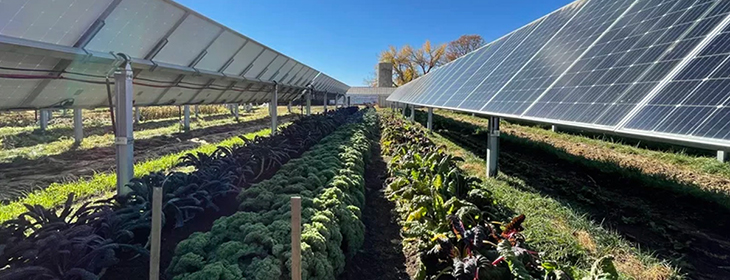

A Game-Changer for Sustainable Farming
A groundbreaking study led by the University of Sheffield highlights the transformative potential of agrivoltaics, a practice that combines solar energy production with agricultural activities on the same land. This innovative approach has demonstrated significant benefits, including increased crop yields, reduced water usage, and the generation of renewable energy, particularly in regions vulnerable to climate change.
Agrivoltaics: A Sustainable Farming Revolution
The research, conducted in collaboration with the University of Arizona and CIFOR-ICRAF, reveals that agrivoltaics offers a dual advantage: optimizing agricultural productivity while harnessing solar energy. Key crops like maize, Swiss chard, and beans flourished under the partial shade provided by solar panels, benefiting from reduced water loss through evaporation. Additionally, rainwater collected from the panels was used to supplement irrigation, further conserving water resources.
Professor Sue Hartley, senior author of the study and Vice-President for Research and Innovation at the University of Sheffield, emphasized the broad implications of agrivoltaics. “Imagine a future where farms are powered by clean energy and crops are more resilient to climate change,” she remarked. “Agrivoltaics can make this vision a reality by offering a sustainable solution to the pressing challenges of food insecurity, water scarcity, and energy.”
Creating Microclimates for Resilient Crops
One of the most compelling findings of the study was the creation of microclimates beneath the solar panels. The shade provided by the panels not only improved crop survival during heat waves but also enhanced yields for certain crops. “By shading crops with solar panels, we created a microclimate that helped certain crops produce more,” Hartley explained. “The shade also conserved water, which is crucial in regions severely threatened by climate change.”
Lead author Dr. Richard Randle-Boggis, now a research scientist at SINTEF, highlighted the multifunctional benefits of agrivoltaics. “By combining solar panels and farming, we were able to get more from the land,” he noted. “This approach boosts food production and clean electricity generation while reducing the need for irrigation.”
Empowering Rural Communities with Renewable Energy
Beyond agricultural benefits, the study underscores the potential of agrivoltaics to deliver reliable, off-grid renewable energy to rural areas. Solar power generated through this system can energize homes, businesses, and farming equipment, significantly improving the quality of life in underserved communities. The integration of vegetation beneath solar panels has an additional advantage: it keeps the panels cooler, enhancing their efficiency in electricity production.
Biodiversity and Agrivoltaics: A Harmonious Coexistence
Critics often argue that solar farms occupy valuable agricultural land, but the study suggests that agrivoltaics can bridge the gap between energy production and ecological balance. A planning guide, Better Biodiversity on Solar Farms, explores how these installations can support native biodiversity. By integrating wildlife-friendly designs and cultivating vegetation beneath panels, solar farms can become active contributors to ecological health.
A Vision for the Future
Agrivoltaics represents a promising solution to some of the most urgent challenges of our time. By addressing food insecurity, water scarcity, and energy needs simultaneously, this innovative approach holds the potential to revolutionize sustainable farming practices. The findings suggest that agrivoltaics can pave the way for a future where agricultural productivity and renewable energy coexist, empowering communities and safeguarding the environment.
The research shines a light on a path forward, where farms not only feed the world but also contribute to a cleaner, greener planet. The combination of scientific innovation and practical application underscores the transformative power of agrivoltaics, offering hope for a more sustainable and resilient future.
What are your thoughts? Please comment below and share this news!
True Activist / Report a typo







